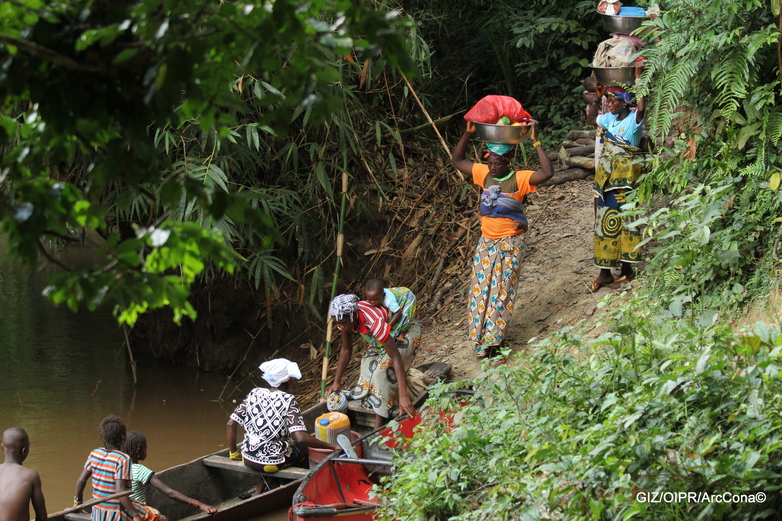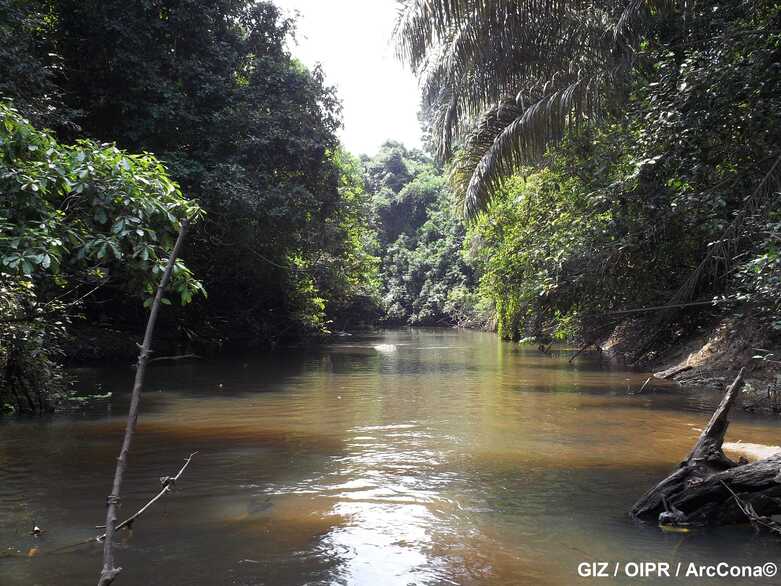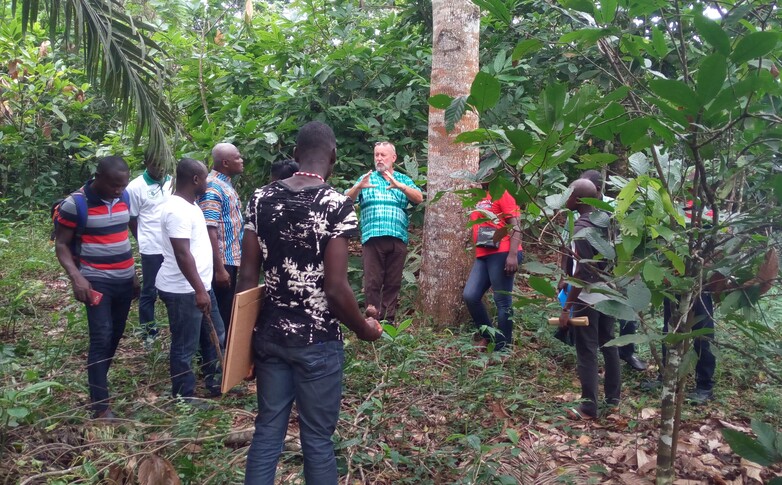Better networking of forest ecosystems in the Taï-Grebo-Sapo region in Côte d’Ivoire and Liberia
Project description
Title: Strengthening ecological connectivity in the Taï-Grebo-Sapo forest complex between Côte d’Ivoire and Liberia
Commissioned by: German Federal Ministry for Economic Cooperation and Development (BMZ)
Countries: Côte d’Ivoire, Liberia
Lead executing agency: Côte d’Ivoire: Ministère de l’Environnement et du Développement Durable (MINEDD); Liberia (Ministry of Planning and Economic Affairs (MPEA)
Overall term: 2015 to 2022

Context
The West African countries of Côte d’Ivoire and Liberia are rich in terms of biodiversity and natural resources. Their exploitation of natural resources and expanding agricultural activities are increasing the pressure on natural forests and biodiversity hot spots, i.e. regions with a large number of endemic and potentially endangered plant and animal species.
The project area extends from the western border of Taï National Park in Côte d’Ivoire across the adjacent Grebo Forest to Sapo National Park in Liberia and contains the largest remaining rainforest in West Africa. Most of the forested areas have protected status. They are uniquely biodiverse and home to many endemic species. The environs of the protected areas are populated, used for agriculture, and still home to scattered local community forests.
However, efforts to preserve this biodiversity are threatened by insufficient organisational capacity and human resources, weak governmental structures, rapid population growth and the extraction of raw materials, such as uncontrolled gold mining. These factors also make it harder to maintain connectivity between protected areas. To date, neither state institutions nor local actors have worked together to link the forest ecosystems in the Taï-Grebo-Sapo border region.
Objective
Government institutions and local stakeholders are jointly working towards connecting the forest ecosystems in the Taï/Grebo-Krahn/Sapo border region.

Approach
The project aims to strengthen local expertise and capacity for the joint management of natural resources and biodiversity and in this way to help bring about a lasting improvement in connectivity between the region’s ecosystems and protected areas. It operates in the border area between Liberia and Côte d’Ivoire and focuses on promoting cross-border cooperation and dialogue between local and national actors and on the participation of women in decision-making processes.
There are four priority areas of activity:
- Informing local people in the Taï/Grebo-Krahn corridor region about land-use planning decisions and ensuring that they are involved.
- Using regional land use development plans to govern the sustainable management of the ecological corridors from the social, economic and environmental perspectives.
- Strengthening the capacity of Liberian and Ivorian stakeholders in the cross-border management of the protected areas, natural resources and ecological corridors by offering joint forums for dialogue, continuing education and by working out agreements.
- Improving the effectiveness of the management systems for the protected areas by introducing and consolidating internationally recognised management tools.
Conceptually, the project complements a partner project of the KfW Development Bank (Kreditanstalt für Wiederaufbau) and the Ivorian Ministry of Environment for the protection of biodiversity in the Taï/Grebo-Krahn/Sapo rainforest complex. With additional financing from the European Union, it implements the funding programme of the West African Economic and Monetary Union for the Conservation of Forest Ecosystems in West Africa (PAPFor) in Côte d’Ivoire and Liberia.
Implementation partners in Côte d’Ivoire are the Protected Area Authority (Office Ivoirien des Parcs et Réserves, OIPR) and the Department for Ecology and the Protection of Nature (DEPN) in the Ministry of Environment. The Foundation for National Parks and Protected Areas (La Fondation pour les Parcs et Réserves de Côte d'Ivoire, FPRCI) is also involved. In Liberia, the implementation partner is the Forest Development Authority (FDA), in particular the Nature Conservation department. The project works in partnership with the Wild Chimpanzee Foundation (WCF) and the United States Agency for International Development (USAID) West Africa Biodiversity and Climate Change (WA-BICC) programme in both countries.

Results
Since 2020, the Ministry of Environment has promoted the establishment of a corridor in Côte d’Ivoire by supporting another internal project, which is controlled by a national steering committee. The local territorial administrations and territorial authorities are included here. Village communities near the corridor zone have approved local development plans that support the establishment of the corridor.
The Grebo forest in Liberia was designated as the Grebo-Krahn National Park in mid-2017. Its managers prepared a management plan in 2020 that also includes a long-term perspective and is attractive for financing partners.
Partnerships between local smallholders and cocoa enterprises have been established on both sides of the border. As a result, sustainable agro-forestry practices are being applied in cocoa growing, increasing the income of farmers and promoting the preservation of species diversity.
Last update: January 2021